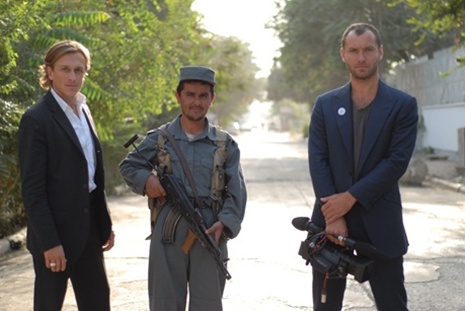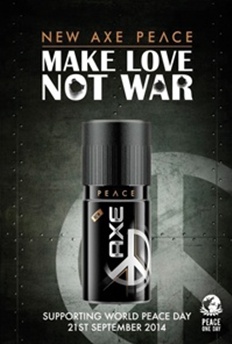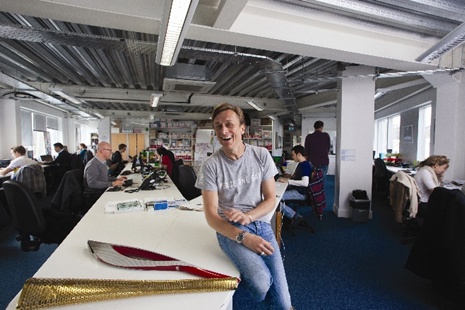Profile: Jeremy Gilley, Peace One Day
Film-maker Jeremy Gilley is on a mission to unite the world through non-profit organisation Peace One Day and is partnering brands including Unilever, Coca-Cola, Innocent and Ocado to spread the word
Above: Unilever CEO Paul Polman with Peace One Day founder Jeremy Gilley
Achieving world peace is not the typical aim of a deodorant targeted largely at teenage boys but ‘Make love, not war’ is the slogan accompanying Unilever’s latest Lynx product (known as Axe outside the UK).
The company is running a campaign in 50 countries to promote its new Peace variant of Lynx. The idea stems from Unilever chief executive Paul Polman’s relationship with Jeremy Gilley, film-maker, former actor and founder of Peace One Day, who in 2001 persuaded all United Nations member states to sign up to Peace Day – a day of ceasefire and non-violence.
Speaking to Marketing Week, Polman says this launch is more than just a funding exercise. Lynx will work with Peace One Day to help young people to positively influence their communities, culminating with Peace Day on 21 September.
“It is imperative for businesses to be involved with organisations like Peace One Day, whose efforts make society function better, because when society functions better, businesses ultimately do better too,” says Polman.
Polman is working with Peace One Day alongside Innocent Drinks co-founder Richard Reed, Ocado co-founder Jason Gissing and brands including F1 Lotus and Skype.
Cynics may question how much impact one day of peace will have, but in 2007 Gilley achieved what many thought was impossible by persuading the Taliban in Afghanistan to stop fighting for 24 hours. As a result of the ceasefire, aid workers were able to enter areas normally plagued by violence and 1.4 million children were immunised against polio in the months that followed.
“It was a beautiful moment,” says Gilley. “I knew if we could get people to stop fighting in one of the most complex places in the world, we could save lives and be optimistic about peace.”
Celebrity ambassadors

Jeremy Gilley and Jude Law in Afghanistan - Law spoke at a Peace Day concert at Wembley in 2012
The Taliban ceasefire was only the start. Despite garnering the support of world figures such as Kofi Annan, Nelson Mandela and the Dalai Lama, and persuading celebrities such as Jude Law and Angelina Jolie to spread the word, Gilley says he will not be satisfied until Peace Day has been embedded in the thinking of “every human being on the planet”.
To help change people’s behaviour he has called on both the skills of marketers and the power of brands.
“It’s like Mother’s Day,” he says. “Anna Jarvis had the idea in 1908 [unconnected with the Christian festival of Mothering Sunday] but it only became institutionalised many years later when the corporate sector got behind it.
“Now on Mother’s Day, we all change our behaviour. We visit our mum, send flowers, make sure dialogue is sensitive and no one is allowed to upset her. We’re noticing that the same is true on Peace Day. People are beginning to change their behaviour.”
Recognising the power and reach of big global brands beyond the traditional rattling of buckets for charitable donations, Gilley decided to seek long-term partnerships.
“You can’t help noticing the corporate branding on the side of Formula One cars,” he says. “It’s those logos that fund them to race, so I wanted to create the same model for Peace One Day.”
In around 2005, Gilley started building relationships with advertising agencies such as McCann Erickson. He says this created an effective way to meet big corporations and led to partnerships with global giants such as Coca-Cola, which featured the Peace One Day logo on its products in a number of markets around the world.
Corporate alliances
After Gilley met Unilever’s Polman – who says Gilley’s passion is “infectious” – the more formal Corporate Coalition membership structure was launched in 2013.
“We helped develop a more robust business plan because Jeremy certainly has the ideas and the creativity but with more connectivity to the responsible corporate sector, I felt we could achieve so much more,” says Polman. “I was fascinated by how he creates these movements and how we could support him because it has to be done in partnership. It cannot be done alone.”

Alongside the advertising campaign for the Lynx Peace deodorant, the brand is encouraging young people to have a positive influence on their local communities.
Lynx has teamed with award-winning producer Naughty Boy and online fashion retailer Asos for the UK activation[1], which began on 15 April, and Unilever has been encouraging people around the world to raise money, donate time to good causes and act in a more positive way as part of the global campaign, explains Polman.
“In Australia we’ve had a big blood donation drive with the Australian Red Cross; in France we are encouraging young people to become peace ambassadors and make music videos; and in Brazil we are bringing competing nations together around the theme of peace,” he says.
“We do things slightly differently in each country but within a single global framework.”
The corporate partnerships are focused on more than just fund-raising.
“It’s about what these brands do with their workforce,” says Gilley. “It’s about their consumers and it’s about the opportunity [brands] have to create the kind of world we ultimately want to live in. They have so much power and so much reach, which is really good news for peace.”
Financial formula
When formulating the financial structure of the Corporate Coalition, Gilley borrowed once more from Formula One, working with former head of sponsorship and marketing for the Williams racing team Jim Wright to build a more solid return-on-investment model for members.
Wright introduced a tiered subscription plan for corporates: $80,000 (£48,000) for bronze, $150,000 for silver and $250,000 for gold. Depending on the level of investment, brands receive image rights, filmed interviews, bespoke case studies and a number of personal appearances by Gilley for internal and external communications purposes. Gold members also receive ownership of a Peace One Day global initiative.
“For me, charity isn’t really the answer,” says Gilley. “It’s the concept of doing well by doing good. Businesses need to have an impact on the world; that’s what gets your workforce fired up and that’s what keeps them loyal.
“Because the more money they make your company, the bigger difference that company can make in the world.”
Richard Reed, co-founder of Innocent Drinks, has long supported the Peace One Day effort and says being involved with the organisation has been “hugely good for driving employee engagement”.
“For Innocent to be playing a small part in what Peace One Day is achieving is incredibly motivational for people who work in the company,” he adds.
But there are other reasons to be involved, says Reed. “The left brain is doing it to drive awareness, brand experience and employee engagement, while the right brain is doing it because you believe in the mission and want to play a part
in helping the world to become a less violent place.”
Gilley’s current focus is the Democratic Republic of Congo (DRC) and the Great Lakes region of Africa. Aided by a $10m donation from Howard G Buffett, the former director of the Coca-Cola Company, Peace One Day hopes to make a positive impact as part of a three-year campaign.
Using the power of celebrity once more, Gilley has recruited hip-hop star Akon, who he describes as “the Michael Jackson of Africa”, to perform at the annual Peace Day concert, which in past years has attracted artists such as Elton John, Bryan Adams, Pixie Lott, Annie Lennox and Lenny Kravitz. This year’s event will take place in Goma, a city in the east of the DRC.
“I knew when I went to the DRC and the Great Lakes region of Africa that Akon would be one way I could tell the entire country [about Peace Day],” says Gilley. “We’re doing a massive show that we will be giving to the radio stations and everybody else for free. Because of that awareness, there will be excitement and the people in the DRC will know that the international community cares.”
Gilley describes the concert as a “lighthouse” for the wider efforts of Peace One Day and a means of informing people about the progress the organisation has made in promoting peace in areas of conflict, as well as what it has achieved locally by reducing violence in homes and schools.
“Each corporation has a niche area [that it wants to help] so we work together to create something that is complementary,” says Gilley.
Jason Gissing, departing co-founder of online supermarket Ocado, has been a supporter of Peace One Day from the beginning and has been heavily involved in some of its UK initiatives.
“We sponsored an educational source that went into primary schools and has since become part of the national curriculum,” he says.
“It teaches children about bullying and domestic violence and shows them how to resolve disputes peacefully with dialogue – not by resorting to violence.”
Winding down

Although it is rewarding for Gilley to know that his efforts are contributing to a more peaceful world, it is an emotional and sometimes harrowing job. To wind down, he spends time with his three-year-old daughter.
“[The only time I] completely shut off is when I spend time with my little girl. That’s when everything changes. I don’t allow any phone calls and it’s a phenomenal quality of time. For me, that’s when I’m free of everything,” says Gilley, who is also a keen wakeboarder and likes to have “a good old dance” to relax.
Gilley’s Peace One Day journey began through his work as a film-maker and he has documented the evolution of the organisation since 1999 through films including Peace One Day and The Day After Peace.
He has recorded every meeting, event and landmark achievement, updating the story and informing people of his progress daily through social media.
“If you put a camera in the right place at the right time with the right question, it holds people accountable for their actions,” he says. “That’s the power of media.
“They used to say the pen is mightier than the sword but the camera is much mightier. It’s an awesome object that can help change the world.”
Brands on peace
“The window of opportunity afforded by just one day of global peace results in widespread humanitarian work across a range of issues, including health, the environment and quality of life.”
Paul Polman, chief executive, Unilever
“Innocent has always given a minimum of 10 per cent of its profits to charity to help tackle hunger in some of the world’s poorest countries. The more you can help people with their basic needs, the more you cultivate the conditions for peace to prosper. It’s only when people don’t have access to the things they need that they have to take more desperate measures.”
Richard Reed, co-founder, Innocent
“If we do things that are good and worthy, it means the people who work for us are happier and our customers feel differently about us because we stand for something they can relate to.”
Jason Gissing, co-founder, Ocado
Measuring awareness
Jeremy Gilley approaches the promotion of Peace Day like a consummate marketer, focusing on partnerships to get maximum value for both parties.
“We’ve created the day, we’ve proved it can save lives and we know that when people are aware of it there’s a decrease in violence. We are working with the corporate sector to tell as many people as we can because we know that telling people that the day exists saves people’s lives,” he says.
Thanks to the support from Peace One Day’s corporate partners and the efforts of its team, more than 470 million people were aware of Peace Day 2013, a 68 per cent increase on 2012, according to analysis by McKinsey & Company. As a result, 2 per cent – eight million people – are estimated to have behaved more peacefully on 21 September.
But the initiative is not all about a single day. The data shows that 73 per cent of the dialogue about Peace One Day happens throughout the rest of the year. “It’s like climbing a mountain,” says Gilley. “The actual climb takes place on 21 September but all the preparation and training happens in the months before as you gear up for the day.” Awareness is being driven notably through the work done by Peace One Day in the education and youth sectors of 197 countries. It reached 171 million people in 2013 through UN events, online games, Skype talks with the Peace One Day team and other activities with corporate partners. The latest statistics show that 600 million people are aware of Peace Day and the figure is expected to reach 1.5 billion by the end of 2014.
“I think we will see three billion people aware of Peace Day by 2016,” says Gilley. “So if corporations are interested in those numbers, we urge them to come forward because the corporate sector is key to the success of all of this.”
Three milestone dates for Peace One Day
1999: Peace One Day launches to a crowd of just 114 people at the Globe Theatre in London
2001: All member states of the United Nations agree to an annual day of ceasefire and non-violence
2007: All fighting in Afghanistan stops on 21 September for a day, enabling 1.4 million children to be vaccinated against polio
Five ways to get charity/brand partnerships right
Get consumers involved
Mondelez International is giving customers of its Kenco coffee brand the opportunity to collect points and support coffee-farming communities[2] by donating books, uniforms and stationery to a Mondelez-founded school in Honduras, or help fund a water tank installation project in Peru.
Be innovative
Choosing leading partners will give the alliance gravitas. Through its partnership with wildlife charity WWF, Coca-Cola is helping to develop more sustainable water stewardship practices for businesses. WWF will share the evidence of this work with governments, industry and the public.
Make sure all parties benefit
Of the work done by Innocent with Peace One Day, co-founder Richard Reed says: “It has to be truly holistic. We help financially and by driving awareness, but [in return] it gives our consumers a deeper brand experience so it’s a triple win.”
Use it to influence strategy
A partnership can be useful at a strategic business level. As part of its Plan A sustainability drive, M&S works with Oxfam on a number of initiatives[3], which the retailer says are vital to the strategic direction of the business.
Get the partnership noticed
Be proud of the work done together. Fairy has been working with the Make-A-Wish Foundation for the past 10 years. To celebrate the anniversary, it launched a big-budget TV ad at Christmas featuring Game of Thrones star Sean Bean to illustrate the work of the charity.
Q&A
Jeremy Gilley
Founder
Peace One Day
Marketing Week (MW): What kind of impact have the corporate partnerships you’ve created had on Peace One Day?
Jeremy Gilley (JG): For us, it’s absolute survival. If it weren’t for these corporations, we wouldn’t be here today. We’re a non-profit organisation so it doesn’t make a difference to my salary if we make £100,000 or £200,000 this week, but it will make a massive difference to the people we touch around the world and the people who are going to be inspired to participate in life-saving activity. Peace One Day never makes a political statement. We never say anything is right or wrong. We’re about coming together as one – separate from politics and religion – and moving towards a moment of global unity.
MW: How collaboratively do you work with the Corporate Coalition members?
JG: We get in a room and we work it out. It’s really bespoke. The Corporate Coalition is all about bringing corporations who care about a more peaceful and sustainable world into our network and working alongside them to inform people that this day exists. Before we did the educational work with Ocado last year, for example, we spent hours talking to figure out what would get the best result, how we should deliver it and what kind of language we should be using.
MW: How important is it for brands to promote sustainability and peace in addition to their brand message?
JG: It’s fundamental. Any corporation that isn’t investing in a more peaceful and sustainable world is behind the times. It’s about doing well by doing good. You can do well and you can do good but the two things should go hand in hand. Any corporation that doesn’t have that type of philosophy is going to lose out. We’re living in the most peaceful time we’ve ever been in and that’s driven by the corporate sector. They know that peace is good for business because it means you can trade. If the corporate sector supports us to create peace, it’s good news for their profits and it’s good news for the world.
References
- ^ Lynx has teamed with award-winning producer Naughty Boy and online fashion retailer Asos for the UK activation (www.marketingweek.co.uk)
- ^ customers of its Kenco coffee brand the opportunity to collect points and support coffee-farming communities (www.marketingweek.co.uk)
- ^ M&S works with Oxfam on a number of initiatives (www.marketingweek.co.uk)









